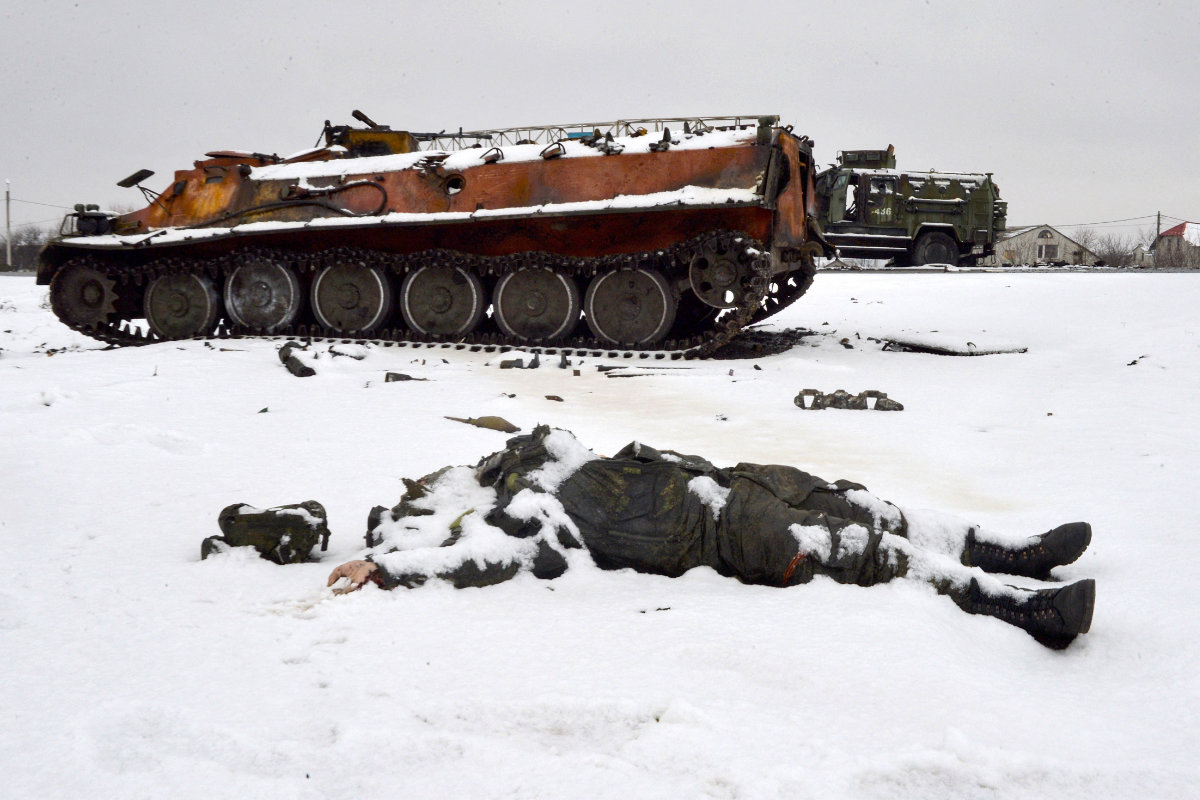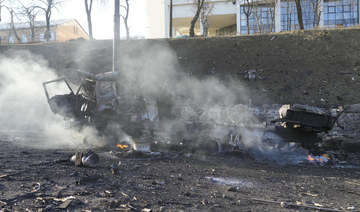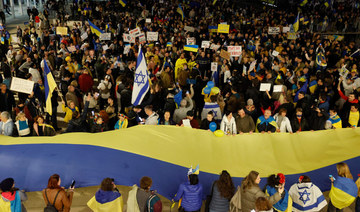KYIV: In a dramatic escalation of East-West tensions over Russia’s invasion of Ukraine, President Vladimir Putin ordered Russian nuclear forces put on high alert Sunday in response to what he called “aggressive statements” by leading NATO powers.
The order means Putin wants Russia’s nuclear weapons prepared for increased readiness to launch and raises the threat that Moscow's invasion of Ukraine and the West's response to it could boil over into nuclear warfare.
Amid the worrying development, the office of Ukraine’s president said a delegation would meet with Russian officials as Moscow’s troops drew closer to Kyiv.
Putin, in giving the nuclear alert directive, cited not only the alleged statements by NATO members but the hard-hitting financial sanctions imposed by the West against Russia, including the Russian leader himself.
Speaking at a meeting with his top officials, Putin told his defense minister and the chief of the military’s General Staff to put the nuclear deterrent forces in a “special regime of combat duty.”
“Western countries aren’t only taking unfriendly actions against our country in the economic sphere, but top officials from leading NATO members made aggressive statements regarding our country,” Putin said in televised comments.

The body of a Russian soldier lies near destroyed Russian military vehicles on the roadside on the outskirts of Kharkiv on Feb. 26, 2022, following the Russian invasion of Ukraine. (Photo by Sergey Bobok / AFP)
White House press secretary Jen Psaki said Putin was resorting to a pattern he used in the weeks before launching the invasion of Ukraine, "which is to manufacture threats that don’t exist in order to justify further aggression. The global community and American people should look at it through that prism. We’ve seen him do this time and time again.”
She told ABC's “This Week” that Russia has not been under threat from NATO or Ukraine.
“This is all a pattern from President Putin and we’re going to stand up ... ,we have the ability to defend ourselves but we also need to call out what we’re seeing here,” Psaki said.
Putin threatened in the days before Russia's invasion to retaliate harshly against any nations that intervened directly in the conflict in Ukraine, and he specifically raised the specter of his country’s status as a nuclear power.
The US ambassador to the United Nations responded to the news from Moscow while appearing on a Sunday news program.
“President Putin is continuing to escalate this war in a manner that is totally unacceptable,” Ambassador Linda Thomas-Greenfield said. “And we have to continue to condemn his actions in the most strong, strongest possible way.”
The practical meaning of Putin’s order was not immediately clear. Russia and the United States typically have the land- and submarine-based segments of their strategic nuclear forces on alert and prepared for combat at all times, but nuclear-capable bombers and other aircraft are not.
If Putin is arming or otherwise raising the nuclear combat readiness of his bombers, or if he is ordering more ballistic missile submarines to sea, then the United States might feel compelled to respond in kind, according to Hans Kristensen, a nuclear analyst at the Federation of American Scientists. That would mark a worrisome escalation and a potential crisis, he said.
The alarming step came as street fighting broke out in Ukraine’s second-largest city and Russian troops squeezed strategic ports in the country's south, advances that appeared to mark a new phase of Russia's invasion following a wave of attacks on airfields and fuel facilities elsewhere in the country.
Around the same time as Putin's nuclear move, Ukrainian President Volodymyr Zelenskyy's office said on the Telegram messaging app that the two sides would meet at an unspecified location on the Belarusian border. The message did not give a precise time for the meeting.
The announcement came hours after Russia announced that its delegation had flown to Belarus to await talks. Ukrainian officials initially rejected the move, saying any talks should take place elsewhere than Belarus, where Russia placed a large contingent of troops. Belarus was one of the places from where Russian troops entered Ukraine.
The UN Security Council will hold an emergency meeting on the developing humanitarian crisis in Ukraine following Russia's invasion, diplomats said Sunday.
The session will be held in New York on Monday at 3:00 pm (2000 GMT), a diplomat said on condition of anonymity.
It was requested by French President Emmanuel Macron and will feature officials from the UN's humanitarian affairs and refugee agencies.
France has also asked that UN Secretary-General Antonio Guterres speak at the meeting, the diplomat said on condition of anonymity.
The UN Security Council has held three meetings on the Russia-Ukraine crisis in the past week.
Just minutes into the second one on Wednesday, Russian President Vladimir Putin announced that he had sent troops into Ukraine.
The council was also convening a fourth session on Sunday afternoon to vote on a resolution calling for a special session of the General Assembly over Russia's invasion.
Russia on Friday vetoed a council resolution condemning Moscow's “aggression” in Ukraine.
Earlier Sunday, the Ukrainian capital, Kyiv, was eerily quiet after huge explosions lit up the morning sky and authorities reported blasts at one of the airports. Only an occasional car appeared on a deserted main boulevard as a strict 39-hour curfew kept people off the streets. Terrified residents instead hunkered down in homes, underground garages and subway stations in anticipation of a full-scale Russian assault.
“The past night was tough – more shelling, more bombing of residential areas and civilian infrastructure," Zelenskyy said.
Until Sunday, Russia's troops had remained on the outskirts of Kharkiv, a city of 1.4 million about 20 kilometers (12.4 miles) south of the border with Russia, while other forces rolled past to press the offensive deeper into Ukraine.
Videos posted on Ukrainian media and social networks showed Russian vehicles moving across Kharkiv and Russian troops roaming the city in small groups. One showed Ukrainian troops firing at the Russians and damaged Russian light utility vehicles abandoned nearby.
The images underscored the determined resistance Russian troops face while attempting to enter Ukraine's bigger cities. Ukrainians have volunteered en masse to help defend the capital, Kyiv, and other cities, taking guns distributed by authorities and preparing firebombs to fight Russian forces.
Ukraine's government also is releasing prisoners with military experience who want to fight for the country, a prosecutor's office official, Andriy Sinyuk, told the Hromadske TV channel Sunday. He did not specify whether the move applied to prisoners convicted of all levels of crimes.
Putin hasn’t disclosed his ultimate plans, but Western officials believe he is determined to overthrow Ukraine’s government and replace it with a regime of his own, redrawing the map of Europe and reviving Moscow’s Cold War-era influence.
The pressure on strategic ports in the south of Ukraine appeared aimed at seizing control of the country's coastline stretching from the border with Romania in the west to the border with Russia in the east. A Russian Defense Ministry spokesman, Maj. Gen. Igor Konashenkov, said Russian forces had blocked the cities of Kherson on the Black Sea and the port of Berdyansk on the Azov Sea.
He said the Russian forces also took control of an airbase near Kherson and the Azov Sea city of Henichesk. Ukrainian authorities also have reported fighting near Odesa, Mykolaiv and other areas.
Cutting Ukraine’s access to its sea ports would deal a major blow to the country’s economy. It also could allow Moscow to build a land corridor to Crimea, which Moscow annexed in 2014 and until now was connected to Russia by a 19-kilometer (12-mile) bridge, the longest bridge in Europe which opened in 2018.
Flames billowed from an oil depot near an airbase in Vasylkiv, a city 37 kilometers (23 miles) south of Kyiv where there has been intense fighting, according to the mayor. Russian forces blew up a gas pipeline in Kharkiv, prompting the government to warn people to cover their windows with damp cloth or gauze as protection from smoke, the president’s office said.
Ukrainian military deputy commander Lt.-Gen. Yevhen Moisiuk sounded a defiant note in a message aimed at Russian troops.
“Unload your weapons, raise your hands so that our servicemen and civilians can understand that you have heard us. This is your ticket home,” Moisiuk said in a Facebook video.
The number of casualties so far from Europe's largest land conflict since World War II remains unclear amid the fog of combat.
Ukraine’s health minister reported Saturday that 198 people, including three children, had been killed and more than 1,000 others wounded. It was unclear whether those figures included both military and civilian casualties. Russia has not released any casualty information.
Ukraine's UN ambassador, Sergiy Kyslytsya, tweeted Saturday that Ukraine appealed to the International Committee of the Red Cross “to facilitate repatriation of thousands of bodies of Russian soldiers.” An accompanying chart claimed 3,500 Russian troops have been killed.
Laetitia Courtois, ICRC’s permanent observer to the UN, told The Associated Press that the situation in Ukraine was “a limitation for our teams on the ground” and “we therefore cannot confirm numbers or other details.”
The United Nations’ refugee agency said Sunday that about 368,000 Ukrainians have arrived in neighboring countries since the invasion started Thursday. The U.N. has estimated the conflict could produce as many as 4 million refugees, depending how long it continues.
Zelenskyy denounced Russia’s offensive as “state terrorism.” He said the attacks on Ukrainian cities should be investigated by an international war crimes tribunal and cost Russia its place as one of the five permanent members of the United Nations Security Council.
As Russia pushes ahead with its offensive, the West is working to equip the outnumbered Ukrainian forces with weapons and ammunition while punishing Russia with far-reaching sanctions intended to further isolate Moscow.
The US pledged an additional $350 million in military assistance to Ukraine, including anti-tank weapons, body armor and small arms. Germany said it would send missiles and anti-tank weapons to the besieged country and that it would close its airspace to Russian planes.
The US, European Union and United Kingdom agreed to block “selected” Russian banks from the SWIFT global financial messaging system, which moves money around more than 11,000 banks and other financial institutions worldwide, part of a new round of sanctions aiming to impose a severe cost on Moscow for the invasion. They also agreed to impose ”restrictive measures” on Russia’s central bank.
Responding to a request from Ukraine’s minister of digital transformation, tech billionaire Elon Musk said on Twitter that his satellite-based internet system Starlink was now active in Ukraine and that there were “more terminals en route.”
German Chancellor Olaf Scholz, meanwhile, said Sunday that his country was committing 100 billion euros ($112.7 billion) to a special fund for its armed forces, raising its defense spending above 2% of gross domestic product. Scholz told a special session of the Bundestag the investment was needed "to protect our freedom and our democracy.”
Putin sent troops into Ukraine after denying for weeks that he intended to do so, all the while building up a force of almost 200,000 troops along the countries’ borders. He claims the West has failed to take seriously Russia’s security concerns about NATO, the Western military alliance that Ukraine aspires to join. But he has also expressed scorn about Ukraine’s right to exist as an independent state.
Russia claims its assault on Ukraine is aimed only at military targets, but bridges, schools and residential neighborhoods have been hit.
Ukraine’s ambassador to the US, Oksana Markarova, said Ukraine was gathering evidence of shelling of residential areas, kindergartens and hospitals to submit to an international war crimes court in The Hague as possible crimes against humanity. The International Criminal Court's prosecutor has said he is monitoring the conflict closely.
British Foreign Secretary Liz Truss warned Sunday that Putin could use “the most unsavory means,” including banned chemical or biological weapons, to defeat Ukraine.
“I urge the Russians not to escalate this conflict, but we do need to be prepared for Russia to seek to use even worse weapons,” Truss told Sky News.

























